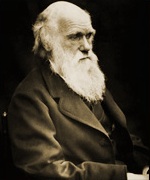Readings on: The theory of evolution–– results and significance
Darwin, Charles The Descent of Man Vol. II, John Murray, London 1891[abridged– 900 words] — human beings are, without doubt, descended from less highly organized formA brief summary will be sufficient to recall to the reader’s mind the more salient points in this work. Many of the views which have been advanced are highly speculative, and some no doubt will prove erroneous; but I have in every case given the reasons which have led me to one view rather than to another.
It seemed worthwhile to try how far the principle of evolution would throw light on some of the more complex problems in the natural history of man. False facts are highly injurious to the progress of science, for they often endure long; but false views, if supported by some evidence, do little harm, for every one takes a salutary pleasure in proving their falseness: and when this is done, one path towards error is closed and the road to truth is often at the same time opened.
The main conclusion here arrived at, and now held by many naturalists who are well competent to form a sound judgment, is that man is descended from some less highly organized form. The grounds upon which this conclusion rests will never be shaken, for the close similarity between man and the lower animals in embryonic development, as well as in innumerable points of structure and constitution, both of high and of the most trifling importance, —the rudiments which he retains, and the abnormal reversions to which he is occasionally liable, —are facts which cannot be disputed.
They have long been known, but until recently they told us nothing with respect to the origin of man. Now when viewed by the light of our knowledge of the whole organic world, their meaning is unmistakable. The great principle of evolution stands up clear and firm, when these groups of facts are considered in connection with others… [they] all point in the plainest manner to the conclusion that man is the co-descendant with other mammals of a common progenitor.
We have seen that man incessantly presents individual differences in all parts of his body and in his mental faculties. These differences or variations seem to be induced by the same general causes, and to obey the same laws as with the lower animals. In both cases similar laws of inheritance prevail. Man tends to increase at a greater rate than his means of subsistence; consequently he is occasionally subjected to a severe struggle for existence, and natural selection will have effected whatever lies within its scope…
I am aware that the conclusions arrived at in this work will be denounced by some as highly irreligious; but he who denounces them is bound to shew why it is more irreligious to explain the origin of man as a distinct species by descent from some lower form, through the laws of variation and natural selection, than to explain the birth of the individual through the laws of ordinary reproduction...
The main conclusion arrived at in this work, namely that man is descended from some lowly organized form, will, I regret to think, be highly distasteful to many. But there can hardly be a doubt that we are descended from barbarians. The astonishment which I felt on first seeing a party of Fuegians on a wild and broken shore will never be forgotten by me, for the reflection at once rushed into my mind —such were our ancestors. These men were absolutely naked and bedaubed with paint, their long hair was tangled, their mouths frothed with excitement, and their expression was wild, startled, and distrustful. They possessed hardly any arts, and like wild animals lived on what they could catch; they had no government, and were merciless to every one not of their own small tribe.
He who has seen a savage in his native land will not feel much shame, if forced to acknowledge that the blood of some more humble creature flows in his veins. For my own part I would as soon be descended from that heroic little monkey, who braved his dreaded enemy in order to save the life of his keeper, or from that old baboon, who descending from the mountains, carried away in triumph his young comrade from a crowd of astonished dogs— as from a savage who delights to torture his enemies, offers up bloody sacrifices, practices infanticide without remorse, treats his wives like slaves, knows no decency, and is haunted by the grossest superstitions.
Man may be excused for feeling some pride at having risen, though not through his own exertions, to the very summit of the organic scale; and the fact of his having thus risen, instead of having been aboriginally placed there, may give him hope for a still higher destiny in the distant future. But we are not here concerned with hopes or fears, only with the truth as far as our reason permits us to discover it; and I have given the evidence to the best of my ability. We must, however, acknowledge, as it seems to me, that man with all his noble qualities, with sympathy which feels for the most debased, with benevolence which extends not only to other men but to the humblest living creature, with his godlike intellect which has penetrated into the movements and constitution of the solar system—with all these exalted powers—Man still bears in his bodily frame the indelible stamp of his lowly origin.


